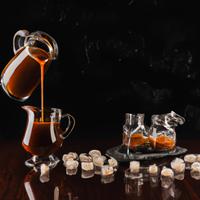
1 serving (20 grams) contains 60 calories, 0.0 grams of protein, 0.0 grams of fat, and 15.0 grams of carbohydrates.

Log this food in SnapCalorie

Nutrition Information
Calories |
714.3 | ||
|---|---|---|---|
% Daily Value* |
|||
| Total Fat | 0 g | 0% | |
| Saturated Fat | 0 g | 0% | |
| Polyunsaturated Fat | 0 g | ||
| Cholesterol | 0 mg | 0% | |
| Sodium | 119.0 mg | 5% | |
| Total Carbohydrates | 178.6 g | 64% | |
| Dietary Fiber | 0 g | 0% | |
| Sugars | 166.7 g | ||
| protein | 0 g | 0% | |
| Vitamin D | 0 mcg | 0% | |
| Calcium | 0 mg | 0% | |
| Iron | 0 mg | 0% | |
| Potassium | 119.0 mg | 2% | |
* Percent Daily Values are based on a 2,000 calorie diet. Your daily values may be higher or lower depending on your calorie needs.
Food Attributes
Source of Calories
About Carmel syrup
Caramel syrup is a sweet, amber-colored condiment made primarily from sugar, water, and sometimes cream or butter, depending on the recipe. With roots in French cuisine, caramel syrup is a versatile ingredient used to enhance desserts, beverages, and breakfast dishes like pancakes and waffles. Its rich, buttery flavor is achieved by heating sugar until it melts and browns, releasing its signature taste. While caramel syrup adds indulgence and sweetness, it is high in sugar and typically contains little to no essential nutrients, making it best enjoyed in moderation. Some store-bought versions may include preservatives or artificial flavorings. While not inherently healthy, homemade caramel syrup can provide a more natural option by avoiding additives. Ideal for occasional treats, it’s a popular choice for flavoring coffee, drizzling over ice cream, or adding depth to baked goods.



